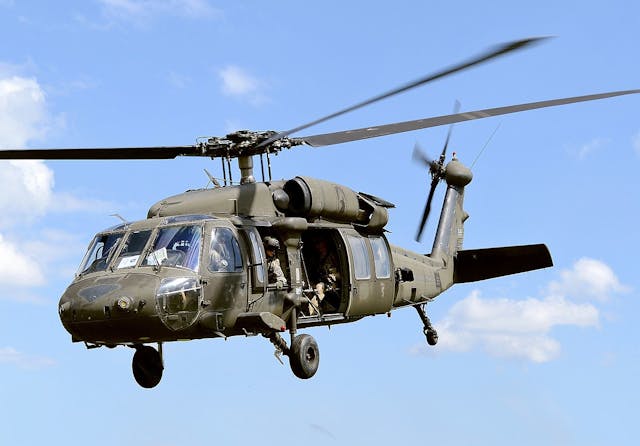Background and Growth of the UH 60 Black Hawk Helicopter
Wiki Article
The Effect of Sustainable Practices on the Future of Aircraft Operations and Emissions Decrease
As the aviation market encounters enhancing examination over its ecological impact, the adoption of lasting practices emerges as an essential pathway toward future airplane operations and discharges reduction. Advancements in lasting aviation fuels and improvements in crossbreed propulsion technologies stand at the leading edge of this change, encouraging substantial reductions in greenhouse gas emissions.
Overview of Sustainable Practices
Lasting practices in aircraft procedures incorporate a variety of approaches focused on lowering ecological effect while maintaining functional performance. These methods are necessary in the aviation sector's dedication to minimizing its carbon impact and sticking to worldwide environmental standards. Secret efforts consist of maximizing flight courses to minimize gas usage, boosting maintenance procedures to make sure airplane run at peak effectiveness, and implementing sophisticated technologies such as winglets and light-weight products that improve aerodynamics.
Educating and involving staff on sustainability methods additionally play an important duty, fostering a culture of ecological responsibility within organizations. On the whole, the integration of these lasting techniques not only helps in reducing emissions however also enhances the long-lasting feasibility of the aviation field, ensuring it satisfies the needs of both customers and regulatory bodies while adding to international sustainability goals.
Innovative Fuel Alternatives
Countless cutting-edge gas choices are becoming essential solutions to lower the air travel market's dependence on conventional nonrenewable fuel sources. Amongst these choices, Lasting Air travel Fuels (SAFs) have actually acquired considerable focus because of their prospective to decrease lifecycle greenhouse gas discharges by up to 80% compared to standard jet gas. SAFs are originated from different feedstocks, including waste oils, agricultural deposits, and also algae, making them a functional choice for the market.An additional promising choice is hydrogen fuel, which, when made use of in gas cells, produces only water vapor as a by-product. In addition, electrical propulsion systems are being explored, leveraging battery innovation to power aircraft.
Finally, biofuels obtained from biomass are being explored, using a renewable option that can be combined with typical fuels. Jointly, these ingenious gas choices represent an important action toward attaining a sustainable aviation ecological community, aligning with international exhausts reduction targets and boosting the industry's environmental stewardship.
Technological Advancements in Air Travel

Exactly how can technical innovations reshape the future of aeronautics? Technologies such as hybrid and electrical propulsion systems are at the leading edge, promising substantial decreases in gas usage and greenhouse gas exhausts.
Additionally, the implementation of innovative products, such as light-weight compounds, contributes to boosted the rules of aerodynamics and gas effectiveness. The use of expert system and machine knowing in trip procedures optimizes path preparation and lowers gas burn by enabling real-time modifications based upon weather and website traffic problems. Additionally, the growth of self-governing and from another location piloted airplane systems stands to transform freight and passenger transport, potentially boosting performance while minimizing human mistake.
Additionally, lasting aviation innovations, including sophisticated air website traffic management systems, can minimize and simplify operations blockage, leading to reduced emissions throughout flight. These developments collectively represent a standard shift in aviation, guaranteeing a future where sustainability and functional performance are intertwined, thereby supporting the sector's commitment to reducing home its environmental influence.

Governing Framework and Conformity
Because of the growing emphasis on environmental stewardship within the aviation market, the governing structure regulating airplane procedures is advancing to promote lasting methods. Regulative bodies, such as the International Civil Air Travel Company (ICAO) and numerous nationwide aeronautics authorities, are presenting rigorous guidelines focused on lowering exhausts and enhancing operational performance.These policies usually include browse around these guys the adoption of Lasting Aviation Gas (SAF), which has actually been acknowledged as a crucial element in achieving lower carbon impacts. Additionally, compliance with these policies requires airline companies to implement operational methods and innovative modern technologies, such as optimized flight courses and enhanced air website traffic administration, to lessen fuel usage.
In addition, the enforcement of exhausts trading systems and carbon offsetting campaigns is becoming increasingly prevalent, engaging airline companies to monitor and report their exhausts accurately. Non-compliance can result in substantial fines, hence pressing operators to focus on sustainability in their company versions.
Ultimately, the evolving regulatory landscape not only drives advancement and financial investment in green innovations however additionally cultivates a culture of responsibility within the aeronautics market. As these structures proceed to create, the concentrate on sustainable practices will be important to attaining the sector's long-term ecological goals.
Future Fads in Aircraft Procedures
As the aviation sector adapts to a progressively rigid regulatory environment, future patterns in aircraft operations are established to concentrate on ingenious solutions that additionally improve sustainability and effectiveness - uh 60. Secret growths will likely include the fostering of innovative air website traffic management systems, which utilize real-time information and man-made knowledge to enhance flight courses, lowering fuel consumption and dischargesAnother considerable fad is the raised combination of lasting aeronautics fuels (SAFs) These choices to standard jet fuel, stemmed from sustainable resources, can dramatically decrease lifecycle greenhouse gas discharges. The industry's commitment to SAFs will likely speed up as airlines team up with fuel producers to make sure accessibility and cost-effectiveness.
Additionally, the press in the direction of electrification and hybrid propulsion systems is obtaining momentum. Emerging aircraft layouts will certainly incorporate these modern technologies, providing quieter and much more effective operations, especially for short-haul flights.
Verdict
To conclude, the combination of sustainable practices in aircraft procedures holds considerable capacity for discharges reduction and enhanced performance. The fostering of lasting air travel gas, coupled with improvements in hybrid and electric propulsion systems, is necessary for lessening lifecycle greenhouse gas discharges. Furthermore, enhancing trip courses and embracing cutting-edge technologies add to a quieter and much more eco-friendly aeronautics field. Jointly, these initiatives align with worldwide sustainability goals and lead the method for a greener future in aviation.
Technologies in sustainable aviation gas and developments look at here now in crossbreed propulsion technologies stand at the leading edge of this transformation, promising significant reductions in greenhouse gas exhausts.Countless cutting-edge gas options are emerging as essential remedies to decrease the air travel sector's reliance on standard fossil gas - uh 60. Among these choices, Lasting Aviation Fuels (SAFs) have actually gained significant interest due to their possible to decrease lifecycle greenhouse gas discharges by up to 80% compared to traditional jet gas.An additional significant trend is the boosted assimilation of lasting aviation fuels (SAFs) The adoption of sustainable air travel gas, paired with advancements in electric and hybrid propulsion systems, is necessary for decreasing lifecycle greenhouse gas emissions
Report this wiki page